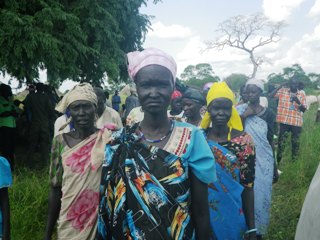Jonglei: Nearly 250,000 still in need of food in greater Bor counties
May 15, 2015(BOR) – At least 248,691 people, majority of the population in the three greater Bor counties of South Sudan’s Jonglei state, are still badly in need of humanitarian assistance and are expecting the situation to get worse, said a state official.

Bor county relief and rehabilitation coordinator, Jok Alier, expressed his worries about the alarming hunger to the populations of the three counties, namely Bor, Duk and Twic East, following the decision made by the WFP to reduce the free feeding ratio.
Alier said the three greater Bor counties qualified for free feeding by the WFP following the crisis of 2013, which made it difficult for the populations to harvest for themselves.
“Last year there was zero harvest, as a result of the conflict in the area, the whole communities were not confident that they would stay in the area and because of that lack of confidence, they failed to cultivate, and majority of people have been depending on relief food,” Alier explained to reporters in Bor town on Wednesday.
He described as “negative” the decision made by the WFP to reduce the ration, saying this would leave the populations vulnerable to hunger.
“Recently, we received negative information from WFP, they reduced food from 100 percent to 50 percent, the distribution this month is going to be 50 percent food ratio, so food security situation is totally bad,” he said.
WFP has been targeting vulnerable people in Bor, Duk and Twic East with unconditional food. These are the people who did not have strength to work, mostly elderly, sick and child-headed families, officials argued.
Another relief organization, Catholic Relief Service, has also been providing conditional food ration to people who were able to work for their communities, by creating and maintaining assets for themselves.
“CRS has a conditional food given to some people who have created some assets, but WFP food is the one given to vulnerable people,” Alier added.
Both WFP and CRS, he said, have also been providing food to internally displaced persons (IDPs) and returnees in Duk county since August 2014, saying the latter was now the main relief provider in the area.
Alier also blamed the situation on the high dollar prices in the market, saying the food prices became very high and majority of the traders were unable to bring food items from foreign countries due to lack of hard currency in the country.
“So I believe the hunger situation in the state will be an alarming situation soon,” he further lamented.
A wider forum between the government and the humanitarian community would be held, according to him, to share their challenges and the steps forward. He said the government and the South Sudan Relief and Rehabilitation Commission (SSRRC) head office in Juba would understand if the reduction in food ration was brought about by funding shortages.
“If the agencies have no funding, then it is something that we cannot negotiate, but the state government has to be informed about it,” he said.
More populations are expected to be hit by hunger crisis in waiting in the northern and western counties of Jonglei state, mainly in the rebels held areas where access by humanitarian agencies would be limited.
(ST)
